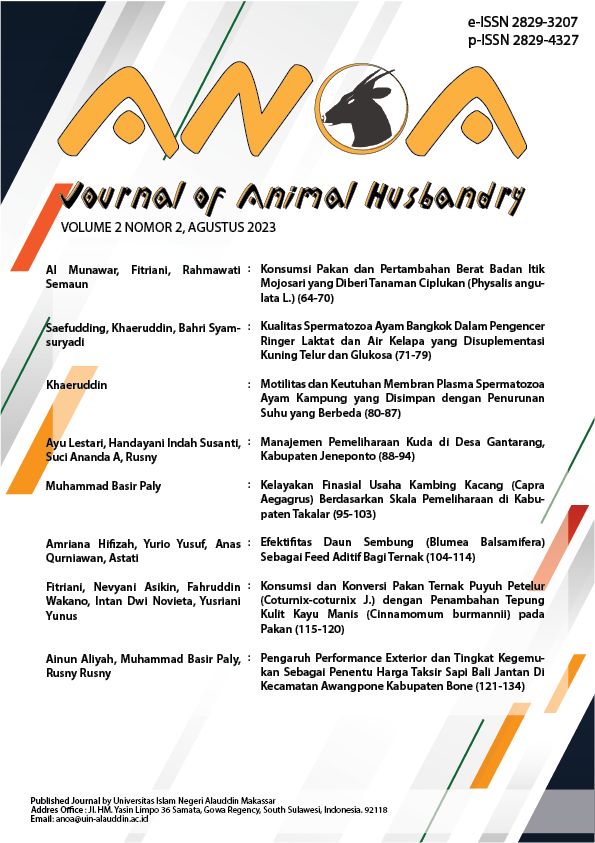Konsumsi dan Konversi Pakan Ternak Puyuh Petelur (Coturnix-coturnix J.) dengan Penambahan Tepung Kulit Kayu Manis (Cinnamomum burmannii) pada Pakan
Consumption and Conversion of Laying Quail (Coturnix-Coturnix J.) with Additions Cinnamon Bark Flour (Cinnamomum Burmannii) on Feed
Abstract
There are several studies which state that Cinnamomum burmannii flour can be used as a natural feed additive for livestock at a certain level. This research was conducted to determine the effect of adding cinnamon bark powder (Cinnamomum burmannii) to laying quail (Coturnix-coturnix japonica) feed on consumption and conversion. This study used 120 laying quails. The method used in this study was a completely randomized design (CRD) consisting of 4 treatments and 3 replications. The four treatments included K0: control or without administration of cinnamon bark flour, K1: addition of 2.5% cinnamon bark flour, K2: addition of 5% cinnamon bark flour, and K3: addition of 7.5% cinnamon bark flour to feed. The research was conducted during the grower period until the peak of production. The data obtained were analyzed using analysis of variance (ANOVA) followed by the average difference test using Duncan. The results of the analysis of variance showed that the effect of adding cinnamon bark powder to the feed had no significant effect (P>0.05) on feed consumption and conversion. The highest ration consumption was the K1 treatment with a cinnamon bark powder concentration of 2.5% with an average of 17.79 g/head and the lowest was the K3 treatment with a cinnamon bark powder concentration of 7.5% with an average of 17.73 gr /tail. Whereas in the conversion value the average value in the K0 treatment is relatively the same as the K1 and K2 treatments, while the K3 gets the highest average value.
Downloads
References
Bakrie, B., E. Manshur & Sukadana, I. M. (2011). Pemberian berbagai level tepung cangkang udang ke dalam ransum anak puyuh dalam masa pertumbuhan (umur 1-6 minggu). J. Penelitian Pertanian Terapan. 12 (1): 58-68.
Data Statistik Peternakan dan Kesehatan Hewan (2020). Direktorat Jendral Peternakan dan Kesehatan Hewan Kementrian Pertanian.
Fenita Y & Suteky, T. (2006). Pengaruh pemberian niasin terhadap kadar kolesterol telur dan perternakan serum darah puyuh (Coturnix- coturnix japonica). Jurnal Sains Peternakan Indonesia. 1(2): 45-48
Konwar, B. K., Banerjee, G. C., 1987. Deoiled karanja cake (Pongamia glabra Vent.) a new feed ingredient in cattle ration. Indian Vet. J., 64 (6): 500-504
Mubarak, Z., Chismirina, S. & Qamari, C. A. (2016). Aktivitas antibakteri ekstrak kayu manis (cinnamomum burmannii) terhadap pertumbuhan Enterococcus faecalis. Cakradonya Dent, 53(9), Pp. 1–76.
Ravindran, P. N., Nirmal, B. K & Shylaja, M. (2004). Cinnamon and cassia the genus cinnamomum: medicinal and aromatic plants-industrial profiles. CRC Press, Washington. D. C, USA.
Santoso U, & Sartini (2001). Reduction of fat accumulation in broiler chickens by sauropus androgynus (katuk) leaf meal supplementation. Asian Australasian Journal Of Animal Sciences 14(3):346-350
Setyawan, A. E., E. Sudjarwo, E. Widodo, & Prayogi H. S. (2011). Pengaruh penambahan limbah teh dalam pakan terhadap penampilan produksi telur burung puyuh. Jurnal Ilmu-Ilmu Peternakan. 23(1):7-10.
Suprijatna, E. (2005). Ilmu dasar ternak unggas. Jakarta: Penebar Swadaya.
Syah, A. (2011). Penambahan tepung daun katuk dalam ransum ayam broiler. Skripsi. Makassar.
Vali, N. & Mottaghi (2016). Pengaruh penggunaan tingkat kayu manis dan bubuk thyme yang berbeda pada karakteristik telur dan lemak profil asam pada puyuh jepang. Jurnal Zoologi CIBTech, 5 (3): 2319-3883. Tersedia di: https://pdfs.semanticscholar.org/84ae/d7be83432705551a9a09e8fcf0a51f7e4080.pdf
Widodo, A. R., H. Setiawan, Sudiyono, Sudibya & Indreswari, R. (2013). Kecernaan nutrien dan performan puyuh (Coturnix coturnix japonica) jantan yang diberi ampas tahu fermentasi dalam ransum. Tropic. Anim. Husbandary. 2(1):51-57.
Yuhendra, Muslim, & Darmiwati (2021). Efek pemberian tepung kulit kayu manis (Cinnamomum burmanii) feed additive ransum terhadap performans ayam broiler. Journal of Animal Center (JAC). Vol.3 No.1, Hal: 24-32.


